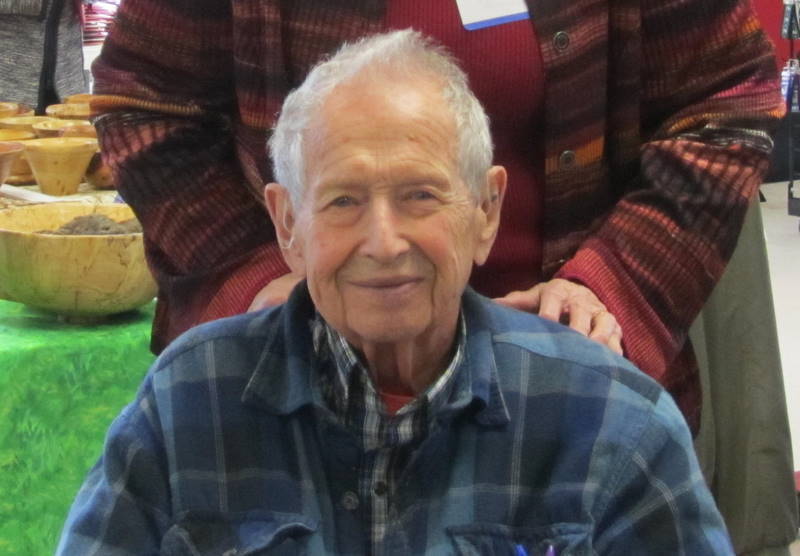WWII Naval Veteran and Electrical Engineer
Celebrate Our Veteran gives voice to the stories of the U.S. military veterans living amongst us. The actions of these brave and dedicated people, who have served our country both in active military duty as well as administrative positions, have and continue to contribute to the protection and preservation of us and our country.
We hope that this section of our paper is an opportunity for our community to hear and see veterans with new eyes, and for veterans to receive recognition and honor for their experiences and life journeys.
This month’s Celebrate Our Veteran recounts the story of Norton Davis, as told in his own words. This is the second chapter of a three-part series, continued from last month. Click here to read Part 1.
by Melissa LaScaleia
“At one o’clock and two-seconds later, there’s a call. I’m in a classroom and an announcement comes in:
“Will Mr. Davis please come in.”
Now in the Navy, they don’t call you ‘Mr.’ unless you’re an officer, going to jail, or something good happened.
So I get in there, and I pick up the phone: “Mr. Davis, the Admiral says he spoke to you earlier about getting off the ship. Would you like to go to Columbus, Ohio, or would you rather go to Glenview, Illinois? I can send you to either one.”
I chose Illinois. Then he said: “I’ll have a car come and pick you up at your barracks in twenty minutes. Also sir, I don’t have time to get you a ticket, so would you mind laying out the money for your train ticket, and by the time you arrive in Illinois, it will be back in your account.”
I told him that would be just fine. And I was off. I was stationed at the airport at Glenview, Illinois, waiting for two more weeks until I earned the point that would take me to get discharged.
I was to hang out in the radio shack for the next couple of weeks. When I arrived, there was a lieutenant in charge and a first class; I was second class, and everybody else was below me.
I had barely walked in when the lieutenant looked out the window— his wife had pulled up in an open car, ready to play golf, and then they were gone. The first class turned to me and said: “You’re in charge.” And he walked out the door.
So I turned to the remaining guys and I said, “What do we do here?” And one of them said, “We’re in charge of the prisoners.”
I said, “What prisoners?”
“They have all these German guys they picked up over in Europe and they sent them over here and we got them here. They don’t make any trouble, they’re glad the war is over. And it’s our job to watch them.”
They kept the German prisoners enclosed in a wire fence some distance away. So I said, “Let’s go see the prisoners.”
And they said, “Okay, we have this truck outside with a 50-caliber machine gun on it. We can take that.”
So I said, “Fine, you drive the truck and I’ll go up there with the machine gun.”
We drove to a big chain link fence, with about 500-600 guys behind it. And I hollered out to them, “Okay, everybody run!” And they all laughed at me.
You can’t get discharged unless you’re in absolutely perfect health. But two nights before I was supposed to get sent to the Great Lakes, I stepped on a board with a nail in it that went right through my shoe into my foot. They patched me up at the hospital and I was limping around there. Now, before you can get on the bus, you have to receive clearance from the hospital.
I called my friend at the barracks and I asked him to bring my bag to the bus, which left at 8:30 in the morning. I told him I was going to try to make the bus.
The only one who could give me clearance was the doctor in charge of the hospital. So about midnight I call him, and I must have woken him up, because he sounded groggy when he answered; then I hung up.
At 2am I called him, he picked up, and I hung up. I did it again at 4am. And at 5am, he came marching in, and said he couldn’t sleep, that some idiot had been calling him on the phone all night.
So I went straight into his office, and I’m walking straight, I’m not limping on that leg. And I said: “My leg is fine. Can I make the draft?”
And he barely looks up and said, “Yeah fine, go ahead.”
So I get on the bus. But I still have this bandage on my foot. The way they give you the exit physical is everybody strips down naked. And you walk from station to station where everyone checks something different.
And I’m walking around with white sweat socks. I get to the guy who checks feet, and:
“What’s with the socks?”
“Oh I have athletes foot, I didn’t want to give it to everybody.”
“Oh, okay.”
I got out on April 17, 1946 and went back to finish college at Purdue. Purdue was still on the wartime schedule: three sixteen-week semesters a year. You don’t get the summers off while people are being shot at.
I finished school, graduating on February 2, 1947 with a degree in electrical engineering with advanced study in factory production and factory management.
Two weeks later I landed a job as a sales engineer. That lasted for three-and-a-half years before the company folded.
Around 1950, during the Korean War, I was looking for a job again, when a friend contacted me. He was with the Signal Corps Engineering Laboratory at Fort Monmouth, New Jersey.
Signal Corps used civilian engineers to help design electronic equipment and to make sure that the equipment could be adjusted, repaired, and generally maintained by the guys in the field. They also assured that spare parts were available, and worked closely with the manufacturers of the equipment to help with problems and get the equipment shipped.
Signal Corps was loaded with work and needed engineers. It was a good job for me. I had worked, hands on, with all the new fancy electronic equipment during the war, and had had a top secret security clearance.
I had wartime experience dealing with military personnel, and almost four years with factory and manufacturing people. Mainly, though, we were at war; if I could help, that was my first choice—there was no second choice.
Signal Corps told the factory what the equipment was expected to do. The factory then designed the equipment, and every involved agency, department, and branch within the Corps would have to approve the design before they could manufacture it. My department had to make sure that it was repairable before we would approve.
One day, two guys showed up at my office— one had blood on his suit. They had just come back from Korea. They flew to LA, then Newark, then drove to Fort Monmouth, and then came looking for me. They hadn’t even stopped to change their clothes or shower.
One of them said to me, “This isn’t my blood. It was from the pilot of a helicopter that went down. I was on it with him. He was injured in the crash, I wasn’t. I was trying to protect him from the enemy who were lurking around because they came looking to see if anybody was still alive. I got him out of there, dragged him through the brush and kept him hidden and tried to stop the bleeding. But we need new equipment quickly, so we can call a helicopter to come in and rescue us if this happens again.”
Shortly thereafter I got an order to find a way to get it done.”
To be continued. Click here to read Part 3 of 3.
























